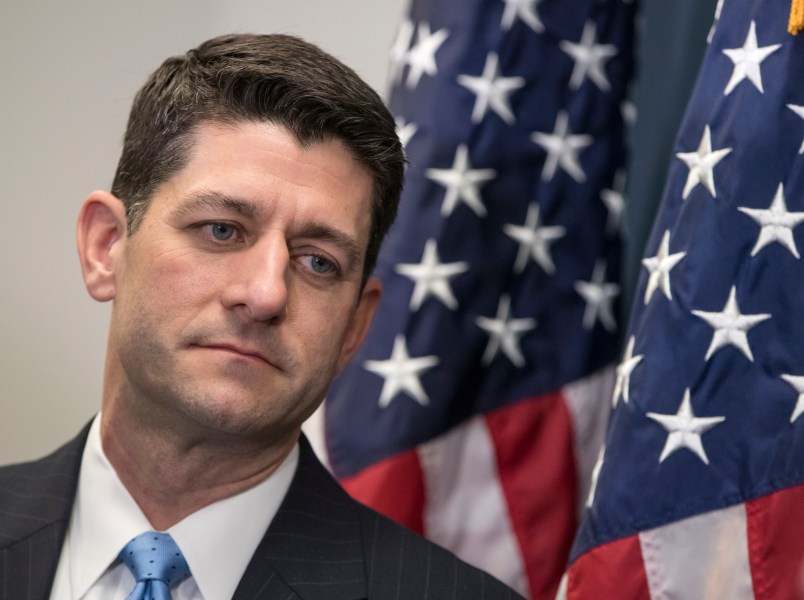Late Friday afternoon, minutes before they were supposed to fulfill eight years of promises to repeal the Affordable Care Act, Republicans choked and pulled their bill amid resistance from both the party’s conservative and moderate wings and fears a floor vote would go down in flames.
President Donald Trump, after demanding a Friday vote less than 24 hours previously, agreed with House Speaker Paul Ryan that the bill be pulled.
The prospects for the legislation’s passage were already looking dim when Ryan made an unscheduled trip to the White House earlier Friday. Later, about a half-an-hour before the vote was expected to begin, the House was abruptly called into recess and House Republicans were summoned to the Capitol basement.
Members poured down the narrow, windowless hallway to the conference room unsure what was going on.
“Hell if I know!” Rep. Mike Simpson (R-ID) told TPM, throwing his hands in the air when asked for the status of the bill.
Mere minutes later, the Republican lawmakers came streaming back out—saying they were told very little other than that the bill had been pulled because it lacked the votes to pass. Many began immediately booking their travel back to their own districts, with one harried lawmaker barking into his cell phone, “Are there flights?” as he hustled toward the elevator.
Some of the few lawmakers who did stop and speak to reporters expressed optimism that Republicans will be able to find a way forward on health care reform, while others characterized Friday as a moment of defeat.
“This bill is done,” Energy and Commerce Chair Greg Walden (R-OR), whose committee had jurisdiction over the legislation, told reporters.
“The Freedom Caucus wins. They get Obamacare forever,” quipped Rep. Michael Burgess (R-TX) who chairs the subcommittee on Health under Energy and Commerce.
“I think the Democrats are celebrating big time,” grumbled Rep. Bradley Byrne (R-AL). “This is a major victory for them.”
What happens next is unclear, both for the Obamacare repeal effort and the rest of the GOP’s legislative agenda.
“I don’t know what else to say other than Obamacare is the law of the land. It’s going to remain the law of the land until it’s replaced,” Ryan said at a press conference following the meeting. “So, yeah, we’re going to be living with Obamacare for the foreseeable future. I don’t know how long it will take us to replace this law.”
The failure of the bill is an acutely embarrassing setback for Republicans, who for seven years made the repeal of the Affordable Care Act central to their campaigns and took dozens of anti-Obamacare votes while never coalescing around a singular, viable alternative plan. The absence of agreement among Republicans over how Obamacare should be replaced – or even on the basic questions of health care policy – grew even more evident after President Trump’s election, when repeal became possible.
Rep. Joe Barton (R-TX) admitted as much as he left the meeting Friday. Reporters asked why, after Republicans held dozens of nearly-unanimous votes to repeal Obamacare under President Obama, they were getting cold feet now that they control the levers of power.
“Sometimes you’re playing Fantasy Football and sometimes you’re in the real game,” he said. “We knew the president, if we could get a repeal bill to his desk, would almost certainly veto it. This time we knew if it got to the president’s desk it would be signed.”

Rep. Joe Barton (R-TX)
Other members attributed the inability to pass a bill to a lack of deep policy knowledge among less experienced lawmakers.
“A lot of the members are new. Most of us were not here when Obamacare was first passed, and so there’s a curve,” said Rep. Morgan Griffith (R-VA) after the Friday meeting. “There have always been these factions, each side had a different — or, probably about eight sides — have different versions of how they would do that, and trying to bring all those together is very difficult.”
Rep. Jim Jordan (R-OH), a former chair of the House Freedom Caucus and one of the bill’s biggest critics from the right, showed little remorse over the bill being pulled.
“Look, there were policy concerns with the legislation, there were process concerns with how it was done,” he said. “The responsible thing to do is to get back to work and to put together legislation that accomplishes what we told the American people, plain and simple.”
The vote was originally scheduled for Thursday—Obamacare’s seventh anniversary—but it was pushed back a day in the hopes that one last round of negotiations could cement support from the GOP’s warring factions. But even after emissaries from the White House delivered a take-it-or-leave-it ultimatum Thursday night and a major last-minute change was added to assuage the far-right hardliners, Republicans were by Friday morning unsure at best that the American Health Care Act would pass.
One of numerous lingering disagreements over the legislation involved the dismantling of Obamacare’s Essential Health Benefits rule. Meant as a concession to conservatives, it was the final straw for some moderates who had wavered on the bill and felt leadership was being too conciliatory to the party’s hard right wing.
The now-scuttled legislation would have also reworked Obamacare’s tax credits, making them less generous and premiums more burdensome on lower-income, rural, and older consumers. But the bill’s most significant impact would have been on Medicaid. The bill would have phased out the Medicaid expansion and, in the long term, would have gutted federal funding for the program. The bill also offered major tax cuts for high-income earners and the insurance industry, though some of those tax cuts were rolled back to pay for last-minute changes.







(Sorry, but I love this!)
http://gif-finder.com/wp-content/uploads/2015/10/Kim-Jong-Un-LaughingClappings.gif
Winning!
Somehow I’m not tired of all the winning yet!
More winning, please!!!
I just liquidated equities and put my entire portfolio into Schadenfreude futures.
To paraphrase Howard Cosell “DOWN GOES TRUMPCARE, DOWN GOES TRUMPCARE”
Oh, darn. I’m just so disappointed. How will I ever recover?